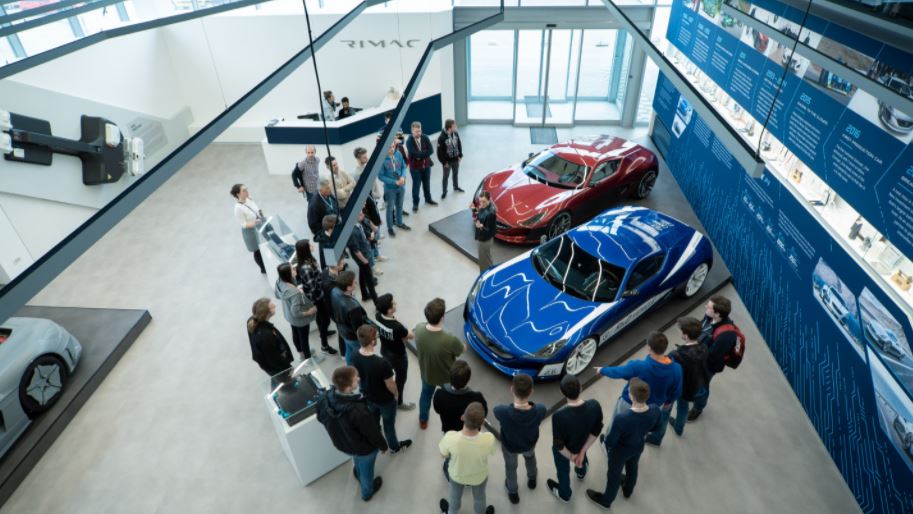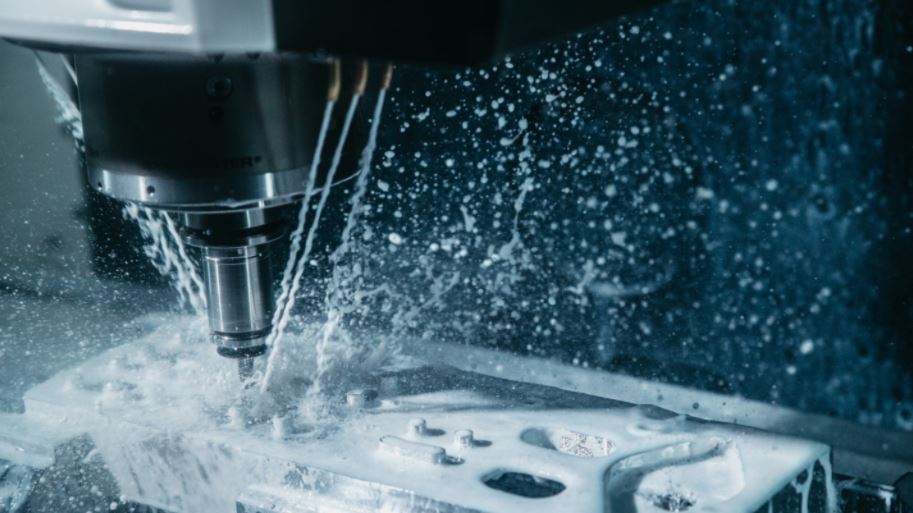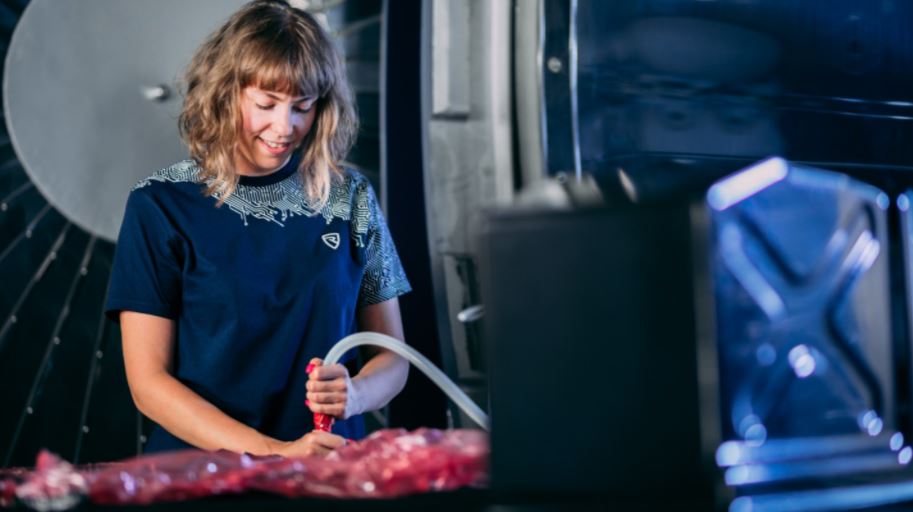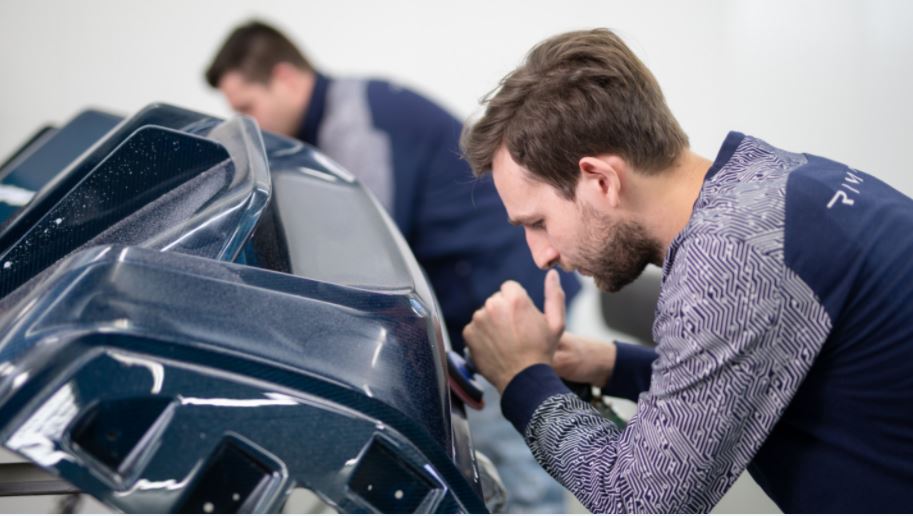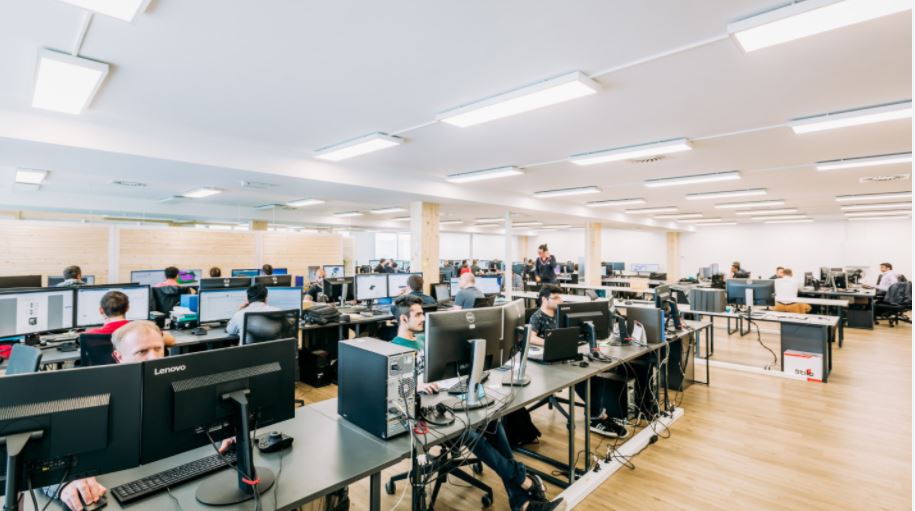Mate Rimac Puts Sveta Nedelja at Top of EU Investment in Climate Tech
October the 27th, 2022 - Croatian entrepreneur Mate Rimac can be praised for many things, from attracting the automotive industry's attention to a small nation without any car production to speak of, to placing Croatia firmly on a map that doesn't involve tourism. The list is a long one, and attracting huge EU investment in climate tech to Sveta Nedelja is another string to his impressive belt.
As Poslovni Dnevnik/Mladen Miletic writes, a new report by PwC, in partnership with Wolves Summit, on the status of climate technology investment in 27 countries across the Central and Eastern European region found that investment in climate technology grew from 10.6 million US dollars back in 2013 to an extremely impressive 398 million dollars in the pandemic-dominated tear of 2020. It continued on that same upward trajectory, reaching more than 502 million US dollars in the first half of 2021 alone.
Although more than 1.76 billion dollars has been invested in climate technologies in the aforementioned region (which includes Croatia) between 2013 and the first half of 2021, the report also states that there are further opportunities for growth and diversification in this country's immediate region. It is also stated that investments in climate technologies in Central and Eastern Europe are more concentrated in the mobility and transport sector (59.8 percent) and in startups based in Estonia and Lithuania (74.8 percent), and it is also interesting to note that the three most active centres of investment in climate technologies are Tallinn, Vilnius, and Croatia's very own Sveta Nedelja!
Although it isn't explicitly stated in this report, the development of Mate Rimac's Rimac Technology, in which Porsche has been rather heavily investing since 2018, as well as the start of the construction of the Rimac Campus spanning more than 70 thousand square metres of production space in Sveta Nedelja, are responsible for this town near Samobor's enviable position. It also confirms a clear tendency towards complete integration into the environment and climate neutrality.
The example of Mate Rimac's remarkable company was pointed out by the vice-president of the EIB, the EU's climate bank, Teresa Czerwinska, during her visit to the City of Zagreb, during which she pointed out that the Republic of Croatia needs more such companies who are focused on contributing to the green transition.
For more, make sure to keep up with our dedicated business section.
Mate Rimac & Dario Zurovec, a Case Study of Politician Entrepreneur Harmony
September 29, 2021 - The entrepreneurial beacon of Sveta Nedelja lit up the Entrepreneurial Mindset 2021 conference in Zagreb yesterday, as Mate Rimac and Mayor Dario Zurovec gave a tantalising view of Croatia 2.0.
It is two years since the introduction of a new conference to the busy Zagreb congress calendar. Poduzetnicki Mindset - Entrepreneurial Mindset - brought together some of the top entrepreneurial names in Croatia to share their stories, visions, and failures. In the front row of the audience where not the usual politicians who left after the opening speeches, but students and high-school kids with entrepreneurial aspirations, looking to learn from the very best in Croatia.
It was one of those rare days in Croatia day to day life (Croatia, the tourist destination is another animal) which dripped in positivity and hope. Attendees left feeling inspired, with so many success stories despite the realities of operating within the bureaucratic confines of the Croatian business reality.
The most high-profile speaker back in 2019 was Mate Rimac, whose entertaining presentation focused in part on how Slovakia built up an entire automotive industry, which today exports more than Croatia's total exports. You can read a report of his presentation in Lessons from Slovakia: Mate Rimac on Croatian Car Industry Potential.
A lot has happened in the Rimac story since then, including plenty of good news for the Croatian automotive industry, as high-profile investments from the likes of Porsche and Hyundai culminated with the acquisition of Bugatti.
Rimac was back at Entrepreneurial Mindset 2021 yesterday, one of a number of star speakers, who also included Silvio Kutic, co-founder of Croatia's very own first unicorn - Infobip. A full recap of an illuminating day can be found here. You can also watch the entire conference on the YouTube video below.
Rimac shared the stage this year with Mayor of Sveta Nedelja, Dario Zurovec, who has been trailblazing in pioneering ways of his own since entering the political scene as Mayor of Sveta Nedelja in 2016. Having won just 22% of the first-round vote in 2016 before going on to win in the second round, Dario Zurovec win a landslide victory in 2021 with a stunning 64.5% of the vote.
And no wonder. His business-friendly approach was paying early dividends, even without the Rimac factor. In an age of emigration, unemployment and depopulation, the population of the small town outside Zagreb has grown 10% since 2011, there are 20% more jobs since 2017, full transparency in local administration, free bus travel for all was introduced last year, and local taxes slashes to encourage more businesses to move to the town. It is little surprise that Sveta Nedelja has been voted the best medium-sized town for the economy three years in a row, or one of the top 5 places to live in Croatia.
Mate Rimac and Dario Zurovec took part in a discussion moderated by Hrvoje Balen called The Leadership Ecosystem - Building Blocks of a Sustainable Future. It was, for me at least, the highlight of a very stimulating day.
The presence of Zurovec at the conference at all was telling of his political mindset. Apart from one MEP, he was the only politician who was present. His declaration that politicians should be there to serve the people sounded a little strange in the Croatian context, and the disconnect between entrepreneurs and the state has been one of the ongoing themes of the conference presentations over the last three years, although several speakers declared that things were slowly getting better.
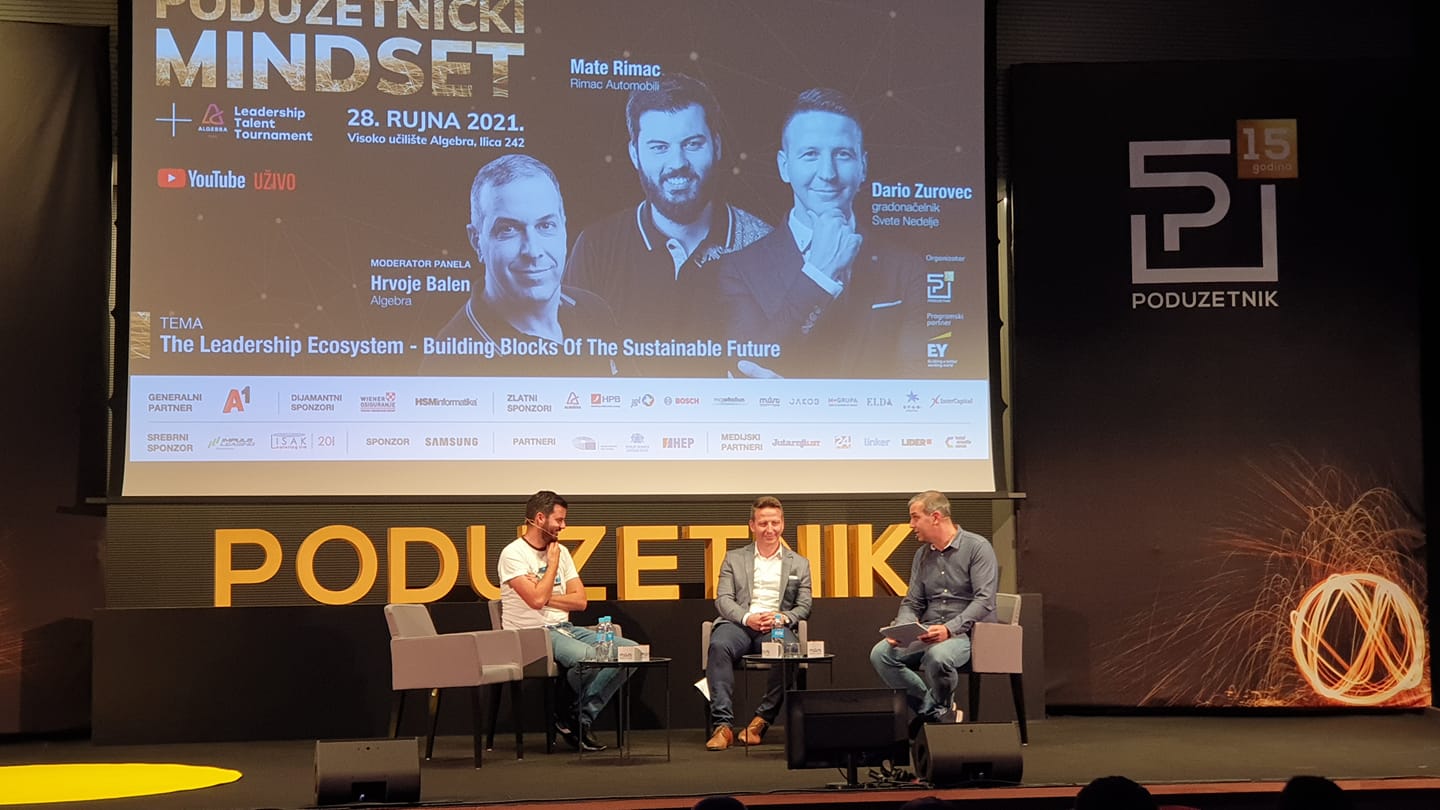
Rimac and Zurovec are clearly glad to have found each other. Friends for some time, Rimac revealed that he has been talking about building his campus even before he became mayor. The campus was one thing, the expanding business another, both of which provide challenges for the local administration to provide the necessary infrastructure and services to meet this increased demand.
Rimac explained that there are now no less than 45 different nationalities working with him in Sveta Nedelja. With the population growth and with more families making the move, there is a growing demand for more schools and kindergartens which now take up a significant part of the Sveta Nedelja budget. Rimac currently employs 1,500 people, the vast majority in Sveta Nedelja, but the campus will bring an additional 2,500 people.
"This campus is a great asset, the largest private investment that has taken place in this part of Croatia, if not beyond," said Zurovec. "And I see only pluses here. The best protection against unemployment is to have a place to work. Some 20 years ago, opposite that campus, there was a company where my father worked, unfortunately, during privatisation, the company went bankrupt, and my goal was always to return to that part of entrepreneurial activity. I am glad that I had the good fortune to come across Mato Rimac and that positive energy that he wanted to invest something. That is courage."
Accommodation, schools, facilities will need to be found for this new influx of people, which brings with it both challenges and opportunities to develop parts of the town to meet that new demand. With a dynamic private sector and a progressive local administration, the development of the building blocks of an ecosytem for a sustainable future are very much in place in Sveta Nedelja. Visionary leadership from the public and private sector working in harmony for the people and the development of the economy does not sound too revolutionary a concept. But it is sadly a rarity in Croatia today. The Sveta Nedelja bubble will be an exciting one to watch.
It would be easy to dismiss the story as being 100% due to the Rimac Factor, but a closer look at what is happening in Sveta Nedelja shows that there are plenty of other businesses contributing to the success story and evolving ecosystem. I was surprised to learn, for example, that Rimac was not even the biggest show in town - at least for now - with another Sveta Nedelja business turning over more than 250,000 million euro a year (Read more in Meet Sveta Nedelja's Biggest Company, a Success Story Born in Syria).
Zurovec pointed out that in Sveta Nedelja they approach each investment individually and thus remove obstacles in the process. He said that more than 920 businesses are now operating in the town.
The Croatian entrepreneurial class has much to contribute to the Croatian economy, and the removal of barriers and bureaucracy will only increase that contribution. Few towns will have a superstar like Mate Rimac, or a true public servant such as Dario Zurovec, let alone both, but the more entrepreeneurs and politicians can find each other on this path, the quicker the ecosystem of a sustainable future can take hold.
An inspiring day.
Health Minister Visits Site of Future Institute of Immunology Factory
ZAGREB, 17 Sept 2021 - Health Minister Vili Beroš on Friday visited the site of a future Institute of Immunology factory in Brezje near Sveta Nedelja, west of Zagreb, where the production of snake antivenom would be relaunched, to be followed by the production of plasma-derived products and child and other vaccines.
Institute of Immunology director Vedran Čardžić said that the construction of the factory, a project worth about HRK 100 million, should start at the end of 2022 or early 2023.
The factory's main product would be vaccines but there are plans to launch the production of antivenom for the duration of preparations for construction work and regulation of the related legal matters.
"We will launch the production of antivenom during preparations for the construction of the new factory. That unit will be part of the new factory which will focus on vaccines against children's diseases (measles). Those vaccines used to be produced by the Institute of Immunology and the state owns the master seeds which international experts say are the best because they give the best vaccination results owing to their properties," said Čardžić.
This is expected to be followed by the launch of production of plasma-derived products and potential adoption of technologies for the production of newer virus vaccines in cooperation with partners, which is being negotiated, he said.
Minister Beroš said that this spring Croatia was faced with a shortage of antivenom, and even though the problem was quickly solved, he noted that as a tourist destination, Croatia should be able to rely on its own antivenom production.
He noted that antivenom production was expected to start before the next tourist season, adding that current employees of the Institute of Immunology would make up the core of the research staff at the new factory.
Čardžić also pointed to the need to attract new experts, noting that he would contact universities to inquire about successful students nearing graduation who would be interested in working at the Institute of Immunology.
Sveta Nedelja Mayor Dario Zurovec expressed hope the project would be a sustainable model of public-private partnership, announcing support by local authorities.
For more on politics, CLICK HERE.
Syrian Who Gave 50 Years to Croatia Passes Away: An Extraordinary Man
September 11, 2021 - He came to Croatia by chance in 1969 but stayed on purpose. The sad passing of Mohamed Radwan Joukhadar from Syria, whose contribution to Vukovar, Sveta Nedelja, and Croatia was immeasurable.
We only met twice, but he left a lasting impression on me, both for his achievements and his humility, and I was very sad to learn yesterday that Syrian entrepreneur Mohamed Radwan Joukhadar passed away a week ago at the age of 73.
Of all the unusual stories I have come across in my time in Croatia, his was one of the most incredible.
"Have you heard about the Syrian in Vukovar who employs 650 Croats?" was one answer to my Facebook post a few years ago. I was looking for unusual stories to write about Croatia.
It sounded barely credible, but when I looked into the statement, it turned out to be an incredible story, once which Mr. Joukhadar told me in person when we found ourselves sitting next to each other at the EY Entrepreneur of the Year award in Zagreb a couple of years ago.
As I recall from his story, he was on his way from Syria to study in Italy when he was persuaded to stop in Zagreb on the way. Croatia was love at first sight (and soon followed by meeting his future Croatian wife, Yasenka) and he decided to stay and study here.
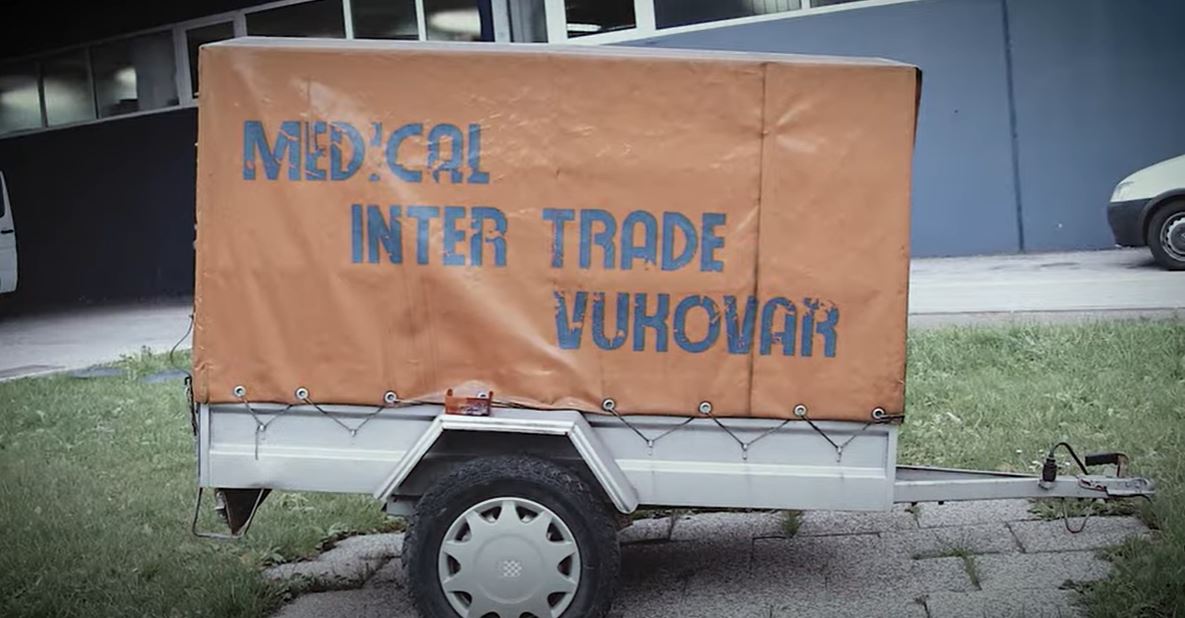
Having graduated with a Master's Degree in Medical Biochemistry in Zagreb, Joukhadar was to put that knowledge to good use in 1990 when the law was changed to allow the wholesale of medicinal products, so he opened the first private wholesale pharmacy in Croatia.
In Vukovar.
It was an inauspicious start, as the brutal siege of Vukovar in 1991 left the city - and his new business - in ruins.
Undeterred, he pressed on, opening the first Joukhadar pharmacy in 1992. Today there are more than 35 pharmacies around Croatia and the region.
Not content to simply sell parmaceuticals, he felt that Croatia could - and should - start to produce more of its own. With that in mind, he built the Yasenka factory in his beloved Vukovar to start to supply Croatia, the region and the world with pharmaceuticals. A particularly strong market due to his medical connections with was Syria and his native Aleppo, and all was set for a lucrative relationship with his home city. And then, just like Vukovar in 1991, those dreams were in tatters due to the systematic destruction of Aleppo in the tragic Syrian conflict.
Despite these setbacks, his wholesale business, Medical Intertrade, grew exponentially and moved to Sveta Nedelja in 1998. When I met My Joukhadar at his office for the second and last time, the incredible success and achievement was plain to see. From such humble beginnings to an annual turnover of 250 million euro and staff of 829 people. While Rimac Automobili was attracting all the plaudits, Medical Intertrade was the biggest show in the town of Sveta Nedelja. In 2018, it was 37th on the list of top Croatian companies by income.
(Mohamed Radwan Joukhadar was a finalist in the EY Entrepreneeur of the Year awards in 2015, see video above)
He put his faith in people and was rewarded by a dedicated and very loyal staff.
"As a company owner, I had full authority to realize my vision into action. I employed young people, uncut diamonds, and polished them one by one until they became a beautiful necklace around the neck of our beautiful Croatia. When you have capable people and an orderly system, it is not a problem to steer such a ship and safely lead it from port to port." Read the full interview in Lider.
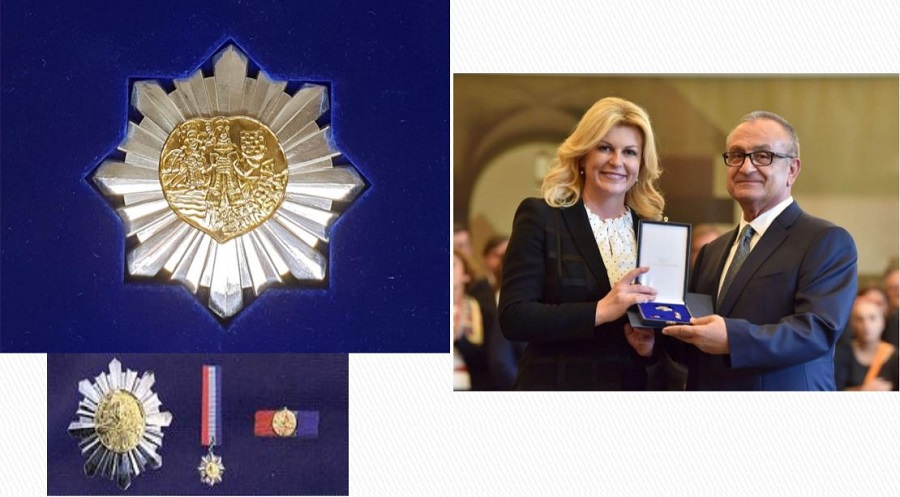
(Joukhadar was awarded the Order of Danica Hrvatska by Croatian President Kolinda Grabar Kitarovic for special merit in the development and improvement of the pharmaceutical profession, and for his humanitarian activities and altruistic help to citizens in Croatia during the Homeland War.)
One man who knew him much better than me was Mayor of Sveta Nedelja, Dario Zurovec, who posted this tribute on LinkedIn:
Today we said goodbye to an exceptional man, humanist and entrepreneur whom we can rarely find anywhere else. Master Radwan Joukhadar, owner of the wholesale drugstore Medical Intertrade in Sveta Nedelja, the Pharmacy of the Joukhadar Pharmacy and the factory for the production of medicines, food supplements and cosmetics Yasenka in Vukovar, the city of heroes. Mr.sc. Radwan Joukhadar is certainly one of the individuals who have perhaps contributed the most to the development of our Sveta Nedelja and Croatia at the same time.
As he said during his lifetime, from his native Aleppo in Syria, he came to Croatia by accident and stayed on purpose. He fell in love with a beautiful lady, Mrs. Jasenka, and has stayed with us since the 1960s. And at the very least he enriched us with his work and deeds.
I could write miles of text about the achievements, awards and recognitions of his companies and him personally, but what impressed me were quite normal, one might say, human things - his favorite coffee, the "master's" coffee that pleasantly surprised me and the approach to work and trade. He always emphasized to me - there is no me, me and me in business. You and me. With this principle, we can only move forward.
His student adventures have always made me laugh and I will remember them as well as the business advice applicable to politics and with which he has achieved tremendously.
As mayor, I will strive for his outstanding deeds and contribution to our region to receive sincere and just recognition in Sveta Nedelja, and I express my sincere condolences to those closest to him.
My condolences to Mr. Joukhadar's family and colleagues.
It's the Mindset: Rimac on Attracting Diaspora, Expats to Sveta Nedelja
August 3, 2021 - Miraculous things are happening in a small town near Zagreb, as local authorities and progressive businesses combine to build a prototype of Croatia 2.0.
Its name translates as Holy Sunday.
And until relatively recently, it was a town which attracted very little national or international attention.
But times have changed.
I made my first visit to Sveta Nedelja less than a year ago. I was certainly curious to see what I would find. For here was the home of the most progressive local administration in all Croatia, as well as the home of the country's global superstar, Rimac Automobili.
Since coming to power against the odds as an independent back in 2016, the achievements of Mayor Dario Zurovic and his team have been nothing short of phenomenal. And his success was recently reflected in the ballot box. Whereas he managed only 22% of the vote in 2016, he was reelected with a whopping 68% four years later. Quite possibly a record increase in Croatia.
The list of achievements are quite exceptional, especially in an era of emigration and economic depression in Croatia. Jobs have increased 20% since 2017, the population up more than 10% since the last census in 2011, texes for businesses have been slashed to make it the most attractive place to set up shop in Croatia. There is free bus transport for all, and a host of other successful initiatives. It is also the most transparent administration in Croatia - no wonder the combination of factors combined so that Sveta Nedelja has been named the best medium-sized town for the economy for three years in a row, as well as one of the best 5 towns for quality of life. Pretty impressive stuff.
And the good news is that the Sveta Nedelja transparency project is exported. The mayor's party, Fokus, picked up four other mayoral positions in Zagreb County in the recent elections, including Samobor, which is already embarking on the path to full transparency, as recently reported by TCN.
And while Mayor Zurovec and his progressive Croatia 2.0 mindset is achieving great things, the biggest name in town these days is one Mate Rimac, whose meteoric rise from a one-man band in a garage with a beat up car to global automobile superstar in a decade is rightly attracting all the column inches.
But for all his fame and offers to develop his business abroad, Rimac remains very grounded and committed to improving Croatia and attracting jobs, innovation and knowhow from abroad. Doing business in Croatia is far from easy, taxation is high, and there are probably dozns of other reasons why it would make much more sense for Rimac to move aborad.
But he believes in Croatia, as he posted in a recent Facebook post:
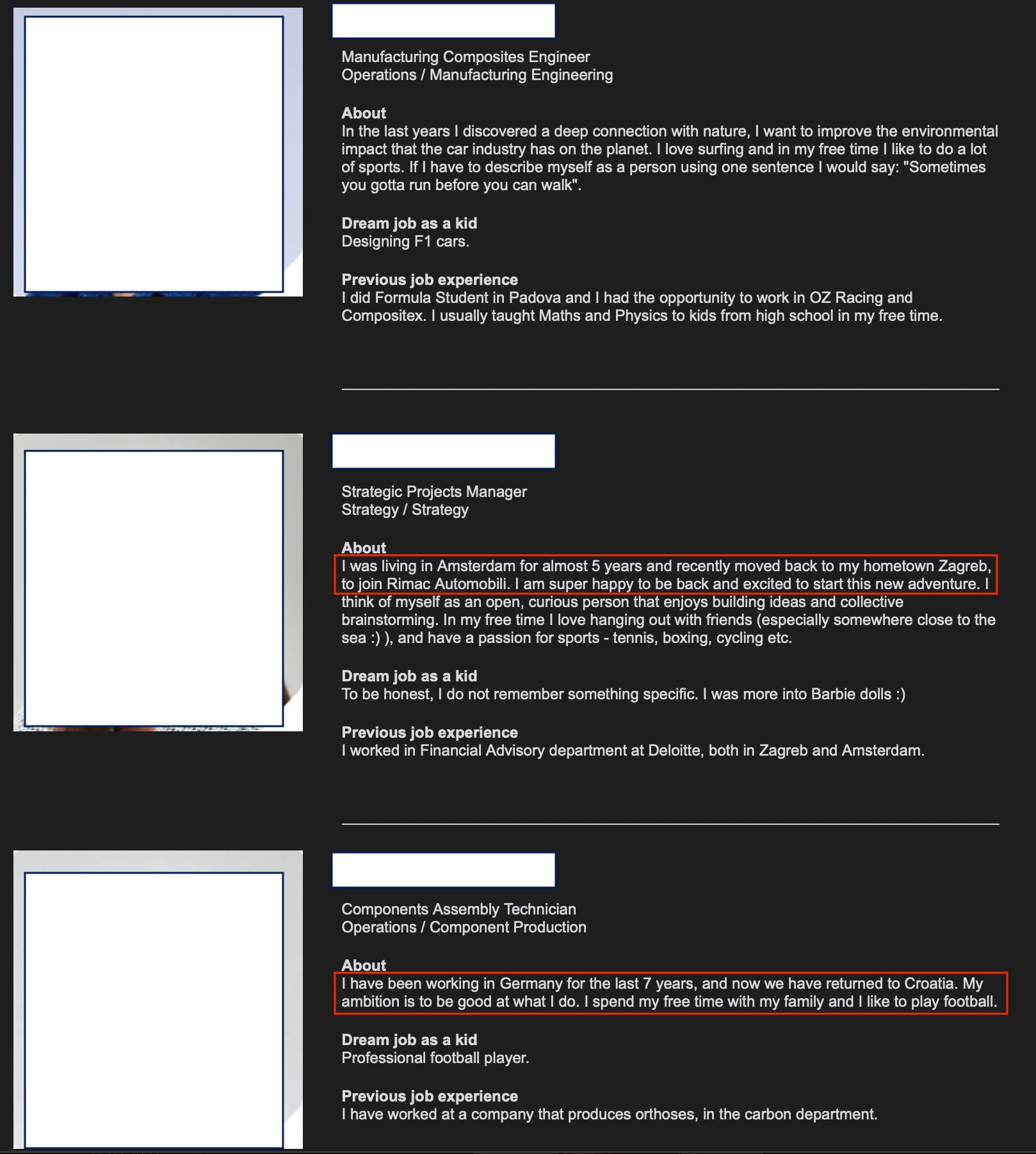
One of my goals from the very beginning was to show that it can be done even in Croatia, to create great jobs here, attract talent from all over the world and also, give the Croatian diaspora an opportunity that is worthwhile coming back for.
Every month all employees get an update about new colleagues that have joined us the previous month. For July, we have almost 50 new employees. It was fun to see this three new colleagues one after the other on the list - the first an Italian moving to Croatia and the other two - Croatians coming back from the Netherlands and Germany to join Rimac.
Many other international colleagues have joined us this month - which makes me very proud. Sveta Nedelja and its surroundings are truly becoming the home of a very diverse population.
Very important to not forget - foreigners are never taking "our jobs" but bring know-how and experience that doesn't exist here, helping us to be a better company, grow faster and even create more jobs for locals. And of course, spreading that know-how here much faster than any university ever could. So it is, without a doubt, a net-positive for the local community. Let's do the best we can to make all our foreign colleagues feel at home.
A tantalising snapshot of a tiny part of Croatia, where a progressive mindset from both the public and private sector can effect real change, improve livelihoods, mindsets and employment opportunities.
Vive la revolution.
For the latest news from Sveta Nedelja, follow the dedicated TCN section.
Davor Nađi Interview: "Fokus Party Not for American-style Economy, Dutch or Scandinavian Preferred"
July 16, 2021 - One month after the local elections in Croatia, the liberal/center Fokus party president shares with TCN reflections of his Zagreb mayor candidacy, details on political views, plans, and hope for the future of Croatia. Learn more about the Fokus party in an exclusive Davor Nađi interview conducted by TCN reporter Ivor Kruljac.
2021 local elections for Croatia concluded back in June, and as with every local election, the majority of political parties whose candidates earned some new positions in the local governments managed to taste both victories and losses are overall happy. Some parties from both left and right political wings celebrated as scientists whose work won the Nobel prize. Even election losses were interpreted as victories, drawing attention to the number of votes, that although they may not score political roles, show growing support. If there is a once in four years occasion when political parties have as much optimism as the Croatian Adriatic has drops of water, it’s the local elections.
Currently in parliamentary opposition, Davor Nađi, president of the Fokus political party, politically declared as center-oriented, also doesn't hide his optimism following the result, but it seems he is a bit more toned down in that excitement than some of his political competitors. Satisfied to see his colleagues from the party keeping their previous positions, and some even selected for new ones, he is expecting the Fokus party to grow in the future while remaining aware of Fokus being new and young on the scene - is careful to say more than he can bargain for. Nađi ran for Zagreb mayor, but in the end, didn't manage to win neither the "main prize" nor a seat in the Zagreb Assembly. He noted, however, that his candidacy helped to attract new Fokus members in Zagreb, but again stating it without grandiose announcements, rather with mild optimism, careful not to step out of the line of realism.
In an e-mail interview, Nađi commented what happened in the Zagreb elections, did NGOs stepped out of line in supporting current mayor Tomislav Tomašević, and what do Fokus voters find attractive in the political party best known for reforming the town of Sveta Nedelja. Are they American-styles libertarians as described by some, and what European politicians are in line with Fokus’s ideas, are just some of the things Nađi revealed in the interview.
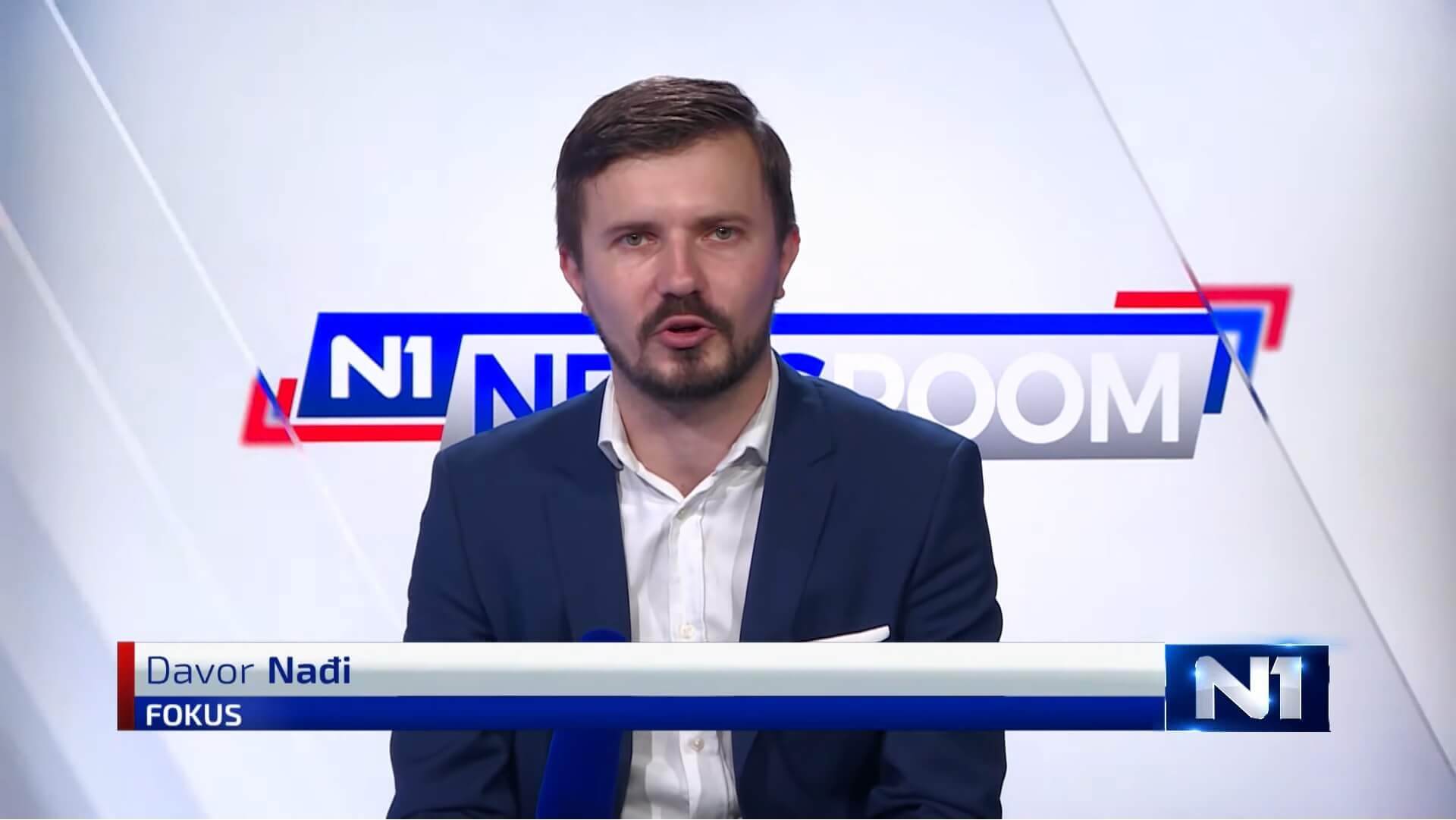
screenshot / N1
You are the president of the Fokus party, and candidates from your party had won in Sv. Nedelja, Samobor, Sv. Ivan Zelina and Dugo Selo. So, your party currently has four mayors. Can you list for our readers where your party had candidates for mayors, assemblies, and counties? How do you comment on „your mayor's" first-month post-election, and what moves would you point out as excellent in that time?
Except for these four cities, we also won in the municipalities of Križ and Pirovac. We ran for mayors and local and regional assemblies mostly in central Croatia (Zagreb and Zagreb county) but also in Čakovec, Slatina, Petrinja, Pirovac. We won 50 members of local and regional assemblies, including the president of assembly in Čakovec.
Most of our mayors were reelected, so they just continued working on projects. However, I would like to point out our new mayor of the city of Samobor, Petra Škrobot, who already contracted procurement of software for transparency of city budget and public procurement, which is one of the flagship policies of the Fokus party.
How would you briefly explain to our readers what your party represents and advocates politically? What politicians, foreign or Croatians are your role models, and why?
We represent the fight for lower taxes and fewer regulations for citizens and the private sector and for a more efficient public sector. That means that we want that people and companies can keep more of the money they earn for themselves and decide on what they want to spend it. For example, that is the only correct way to solve the housing problem – to make sure that people earn and keep more money. Further on, that means that the private sector gets better value for money through better service of the public sector where, in our vision, worst or/and unnecessary public servants would be let go, and the best workers would get a financial reward. We also talk and act on investments in infrastructure, which is important for preparing for future climate change challenges.
I can’t say I have some role models in politics, but I like the politics of Dutch PM regarding the economy because they have a small and efficient public sector that provides good service to their citizens. That allows them to keep their economy very competitive, which results in a better life for their people.
You express deep care for private investments, lowering taxes, and overall creating a better environment for private business and entrepreneurship. But, when talking about entrepreneurs in Croatia, people roll their eyes as many of our famous „entrepreneurs“ are associated with crime, corruption ties to politics, and unfair privatization that ended up in many people losing their job. What is your opinion on these entrepreneurs, such as Todorić or Horvatinčić? How to fix that negative perception of entrepreneurs?
Yes, the private sector is very important to us. We care about entrepreneurs but also about their employees. We also care about the best public servants too.
I think that public opinion on entrepreneurs is changing in a good way because of a new generation of successful entrepreneurs that succeeded in the global market with no connections to the government. Todorić and Horvatinčić are the exact opposite of them and represent everything that is wrong with this country. It’s wrong to call them entrepreneurs because they are a product of crony capitalism. The only cure to fight people like them is an independent and efficient judiciary.
New option for liberals in Croatia
You ran for mayor in Zagreb. The polls didn't give you too much of a chance, but libertarian (classical liberal) oriented site Liberal.hr said that you could be „the biggest surprise of the Zagreb elections“. To tell you the truth, it didn't seem likely you will become a mayor, but I was very surprised you didn't win a seat in the assembly. What went wrong in Zagreb, and how is it possible that the city with the most developed business climate and entrepreneurship (and with a lot of entrepreneurs) didn't reward your entrepreneurship-oriented ideas, at least with the seat in the assembly?
Well, Fokus is a new party, and I’m relatively new in politics, so a lot of people weren’t informed about our program and achievements. Fokus party didn’t exist in Zagreb until this year, while other parties were building their organization for many years, so it was hard to catch up in just a few months period during a partial lockdown. However, even though we didn’t win a seat in the assembly, we achieved some other goals. Now we have a lot of new members, and a strong organization in Zagreb and a lot of people have heard about FOKUS for the first time. Further on, we are the strongest liberal party in Zagreb, and we had better results than a lot of old traditional parties. So I believe that in the future, our support will only grow in Zagreb.
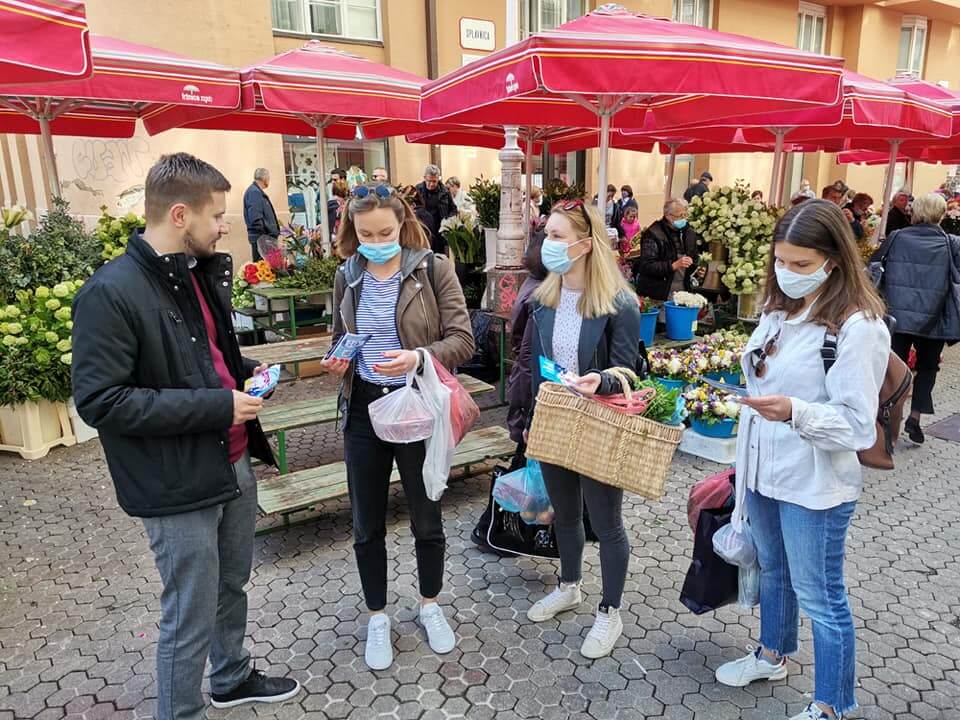
Davor Nađi during his campaign in Zagreb © Davor Nađi
You said on your Facebook site that you didn't receive enough media attention, and indeed you weren't invited to the debates (with the explanation being that only those who earned 5% in polls will be invited). However, you had banners and posters across Zagreb where you talked about how you are experienced to be a mayor because of Sveta Nedelja, where you were a deputy mayor, and the town did receive media attention few years back for amazing changes introduced there. What was your contribution to the transparency of public servants, lowering taxes, and canceling the subtax in Sveta Nedelja as deputy mayor?
I was the designer of those policies with the strong support of mayor Zurovec and the city council, and I was working on these policies from the beginning until the implementation. I’m very proud of that because Sveta Nedelja did the biggest tax cut in Croatia, became the most transparent city in Croatia, and received a reward for the best local economy three years in a row.
You criticized some of the moves by the new Zagreb mayor Tomislav Tomašević. Can you repeat what do you find problematic in his governance so far, but also, is there anything positive, something you would support him in if you made it to the Zagreb assembly?
There are some things that are good, and some are not. I reacted on one occasion, but let's wait a little bit more time before I can comment general impression so far.
However, for our readers who are foreign and didn't have the chance to see your comment in Croatian, can you briefly explain what did you found problematic with Tomašević early on to the point that you had to react publicly?
He stopped most of the public procurement. Even though I understand his concern that there might be corruption problems, that is not the way to solve that problem. That problem should be solved with better process and clear guidance from the mayor to the city administration because if public procurement is stopped for too long, there will be problems for citizens. On the other hand, in a short period of time new mayor will not be able to change much if he doesn’t make the process of public procurement more transparent and efficient.
Far from the US philosophy
Once on N1, you said political parties in Croatia are still pretty socialistic. Since on that occasion you were a guest at N1 regarding Zagreb Reconstruction Bill, did you mean they were socialistic just in that regard or in general? Are Croatians also socialistic too?
They are socialistic in general, and that bill was just the latest example. That orientation of political parties in Croatia resulted in a situation in which an enormous part of the economy depends on the state so we actually have crony capitalism. That sends the wrong message to the people, so people lose self-confidence and think they can’t earn for themselves and their families, and instead, they rely on the state to help them in every aspect of their life. They simply don’t take into account the fact that the state is corrupt and inefficient, which may be because of inadequate financial literacy.
However, it seems to me that the tide is changing with the lead from the local level from cites like Sveta Nedelja and that people are beginning to see the benefits of liberal policies.
When you say the parties are socialistic, some could think this is the heritage of Yugoslavia. However, aside from the communist experiences of South-Eastern Europe, the overall European political culture and tradition goes along the way „yes to democracy, yes to free market, yes to the individual freedoms“ but also „yes to social care, yes to free health, yes to free education, yes to supporting cultural and artistic projects, scientific research, etc“. Many people see Fokus as being against that and wanting to dismantle that European political culture with American political culture, which seems to be notorious in Europe for its health and education system, which as people see it, „is alright if you have cash, but not for the poor“. Are you indeed into „making Croatia American rather than European?“ and if so, how would you address the mentioned sectors of health, education, culture, and science? What about HRT in that context (as the idea of a public TV financed by the state is a European invention in the media landscape)?
Of course, we are not for an American-style economy. We prefer the Dutch or Scandinavian style with high economic freedom and adequate social benefits. Some people don’t understand that “free” health care doesn’t exist. Taxpayers pay for that. And if we think a little bit more about our health care system, do we really have health care that is accessible to the poor? How long are the waiting lists? People pay taxes for health care, and when they need it, then they don’t get it. That is not free health care! Almost the same is for everything else. I believe that vouchers would solve that problem because then even poor people could afford health care service from the private sector, and the public health care system would have to be more efficient and provide better value for money. The same thing is possible with education. HRT should be significantly downsized, and subscriptions decreased with the option to opt-out from their service.
When it comes to the overall Croatian political landscape, Fokus does offer something truly different from other political options, and it seems quite right to expect that Fokus will continue to grow. But, what do you think made Fokus uprise to start in central Croatia, in Sveta Nedelja, Samobor, Dugo Selo, and Sv. Ivan Zelina? Is there something that makes the culture and society in these areas different comparing to the rest of Croatia that they were the first to recognize and give a chance to your program?
Fokus also has a mayor of Pirovac in Dalmatia and president of the city council in Čakovec, members of City council in Slatina, etc, so I wouldn’t say that our policies are only recognized in central Croatia. However, we have better support in parts of Croatia, where fewer people work in the public sector and more in the private sector. That is not surprising since we promote policies that would result in a more efficient public sector and less red tape and taxation for the private sector.
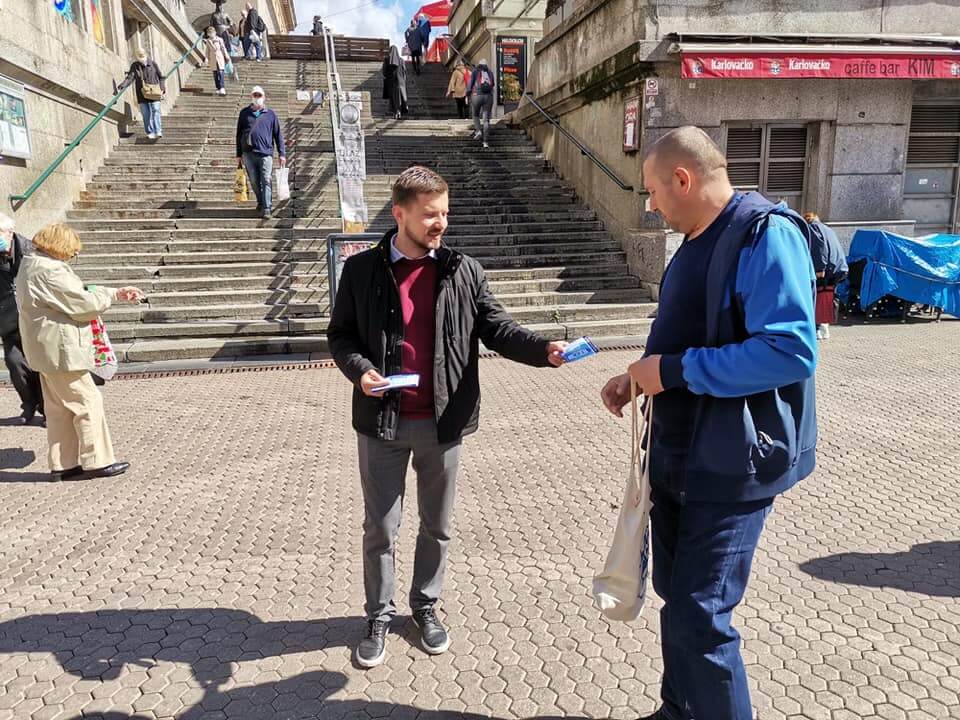 © Davor Nađi
© Davor Nađi
Up next: European elections and Croatian Parliament
On the note of local success, many view local elections as a forecast for what can happen in parliamentary elections. How would you rate your chances on the next parliament elections based on local results?
I’m very optimistic. Fokus has a very good position to grow and to achieve a great result. Fokus is already a success story and we have grown in a number of members in every part of Croatia. I believe that a new government after elections will not be formed without a strong party or coalition from the political center, and if we look at the results of local elections, Fokus is the fourth party by a number of mayors in Croatia. Also, we are the strongest party of the political center in national ratings, so that gives us reason to believe that we can gain even more support from our citizens in the future.
Back to the Zagreb elections. The two main candidates represented Gree-left values and national, conservative, sovereign values. Tomašević not only got support from some of the other European mayors but, just as with Škoro's values, there are plenty of same-minded people in Europe sharing those values. You mentioned your appreciation for the Dutch Prime Minister, but are you as well in contact with like-minded parties and politicians in the EU?
Fokus is a new party, so we still haven’t formed significant international alliances, but we can see ourselves working with other European liberal parties. Of course, the one with the best results is Dutch VVD that is in power on the state level.
But when we talk about the support that Tomašević or some right-wing parties and NGOs in Croatia had in recent years from abroad; I would say that there is a thin line between support and meddling into elections, and I would say that that line was crossed.
But, can we expect that Fokus will try to be in communication with them? Any plans for running on European Parliament elections as a good point to meet with other think-alike politicians in the EU?
I said that we don't have some significant alliances with them. However, we are in contact with some of them. We will see where that will take us. EP elections could be the first opportunity to test eventual cooperation.
And regarding what you said about there being a thin line between support and meddling in elections and how that line was crossed in Zagreb elections by NGOs, is there a risk of entrepreneurs doing the same thing when supporting, either financially or with public influence, certain parties? How can we prevent such meddling legally but yet with respect to the right of political expression to organizations and individuals?
I don’t see the financial support of Croatian entrepreneurs to political parties as a problem. The problem is only if they receive privileged treatment after the election in return for giving financial support. I would go one step further and say that we should welcome donations of private individuals and companies to political parties because that would mean that political parties would be less dependant on public financing. That should be a normal part of the domestic election process. However, if foreign money is included in financing political parties or their leaders, direct or through other channels, then we as a state have a problem.
To conclude, you are MA of the economy, and you talk a lot about economic solutions. Are our economy and business truly the core issues politicians need to address? Additionally, what are your views and the views of Fokus on defense policy, diplomacy, international relations, emigration policy (asylum seekers trying to enter Croatia), Croatian veterans, diaspora, and the ideological, historical disputes among Croatians, which for better or worse seem to often resolve the elections on a parliamentary level?
It would take a much longer conversation to answer all these questions, but I will try to answer in few sentences. Yes, I believe that economy is the most important issue that needs to be addressed because that is the place where value is created and which provides a better life for people and necessary funding for all government programs. Without a strong economy, the state can’t finance defense or social benefits. Unfortunately, you are right that elections are, in the biggest part, decided on other issues that target emotions rather than reason.
When it comes to defense policies, liberals believe that the basic tasks of the state are to provide to their citizen's rule of law and protection from foreign and domestic threats. So we should have adequate defense capabilities. On the other hand, we have no problem financing social benefits to real war veterans, however almost 30 years after the war, there shouldn’t be any new users of these benefits. Regarding international relations, our position is that Croatia should remain an EU and NATO member with strong relationships with the USA and with a clear position that China can’t be our partner until they don’t behave by the same rules like everyone else with the biggest concern regarding human rights issues.
Even though we are a small country, that doesn’t mean we can’t lead by example. It is up to us if we will stay on the bottom of every European statistic table or we will start going up. We have all the resources we need to thrive.
Learn more about Croatian politics and history since 1990 on our TC page.
For more about politics in Croatia, follow TCN's dedicated page.
Rimac Campus Project Moving Forward, Sveta Nedelja Mayor Signs Contract
April the 17th, 2021 - The Rimac Campus project, which will work to further showcase what Croatia can offer to the automotive world through its most impressive entrepreneur, Mate Rimac, has taken another step towards fruition as the Sveta Nedelja Mayor, Dario Zurovec, signs on the dotted line.
As Poslovni Dnevnik/Suzana Varosanec writes, the signing of the appropriate contract for the future Rimac Campus in Sveta Nedelja between CEO and founder Mate Rimac and Sveta Nedelja Mayor Dario Zurovec will start the wheels turning on a very significant cooperation.
With their signatures on the contract, the Rimac Campus project will officially be off the ground and firmly on track for 2023. Their new headquarters, with a capacity of 2,500 employees and at location only sixteen kilometres away from Zagreb, will cover 200,000 square metres of land in total.
The planned investments in the Rimac Campus project have been announced in the amount of more than 200 million euros - in the form of the construction on the new location which is expected by the end of the year, and its completion is planned for 2023, while on the other hand the size and ambitions of the new Rimac Campus project are so large that according to general estimates, it is set to be among the largest of its kind in all of Europe in terms of its various industries.
However, given the company’s rapid growth, the location is designed so that it can expand over time while still blending in with its natural environment. In the long run, the new location will, as stated, accommodate over 2,500 employees, which exceeds the current number of employees by more than 100 percent, and is therefore going to be divided into two different areas.
The first is the company's headquarters building, where the main functions, management and research and development centres will be located, as well as the offices of Greyp, a company for the production of electric bicycles, which was also founded by Mate Rimac.
For more on Mate Rimac and other Croatian entrepreneurs, make sure to follow Made in Croatia.
Sveta Nedelja Mayor Dario Zurovec Reveals Details of Rimac Investment
March the 26th, 2021 - Sveta Nedelja Mayor Dario Zurovec has spoken out in more detail about the enormous investment tied to Mate Rimac's name.
As Poslovni Dnevnik/Marija Brnic writes, Mate Rimac, as expected, was the only one to submit a binding offer to Sveta Nedelja for the establishment of building rights in a field in Kerestinec, in the area near the old Erdödy Castle, which proved to be an ideal location for his upcoming Rimac campus construction project.
The tender, which closed very recently, envisions the conclusion of a 69-year-long contract, with an annual rent of 199,000 square metres at a price of 0.10 kuna per square meter, and sets out, among other things, a three-year deadline to complete the investment and the beginning of the works beginning within the first 12 months.
Judging by Mate Rimac, who has been looking for such a location for a long time, none of this will be a problem, because the lack of space has been a problem for him for a long time, and he has just announced that he has found a temporary solution to accommodate his current 400 to 500 employees in the former Pevec building located in Jankomir.
Sveta Nedelja Mayor Dario Zurovec revealed that the total investment of Rimac Automobili in the future Rimac campus oriented to new technologies and the automotive industry will amount to more than one billion kuna in total, which is significantly more than what was set out as the minimum amount in the tender (one hundred million kuna) and is being seen as one of the largest investments to have ever taken place in Croatia.
According to data from Rimac's offer, Sveta Nedelja Mayor Dario Zurovec says that the creation of around 700 new jobs is planned, mostly of highly educated members of staff. The location in Kerestinec has already been spatially adjusted to the needs of the Rimac campus project, which, in addition to the production plant and research and development centre, also envisages the construction of a testing laboratory, an information and educational complex, a restaurant and a space for short stays, as well as various facilities for employees such as a gym, sport and recreation areas.
Zurovec has made no effort to hide his sense of pride and satisfaction in the fact that everything is now ready for this huge investment venture, which will result in an even better position of Sveta Nedelja on the Croatian and even on the European investment map.
"This is by far the largest investment in the history of Sveta Nedelja", said Mayor Zurovec proudly, who expects to sign a contract with Rimac Automobili, in accordance with all relevant decisions, in just a week or two.
For more, follow our business section. For up to date coronavirus information specific to Croatia, including travel and border rules, as well as testing centres across the country, bookmark this page.
Rimac Automobili UK Office Opens for Research and Development
March 24, 2021 - The Rimac Automobili UK office for research and development has opened its doors, Mate Rimac announced on Tuesday when British Minister of State for Tade Policy Greg Hands visited Sveta Nedelja.
T.portal reports that Rimac's R&D office has thus opened in the Warwick Enterprise Park and has plans to employ 30 people by the end of this year.
There, the British automotive industry will cooperate with the company's headquarters in Croatia.
Mate Rimac announced the news when Greg Hands visited the company's headquarters in Sveta Nedelja.
Hands, who watched Rimc's cars at Top Gear, said that the Croatian car company was "inspiring."
"He left probably the most famous television car figure in the world, Jeremy Clarkson, without words," Hands said of Rimac's cars.
A new office has opened near the University of Warwick near the city of Coventry.
"It's a great university of engineering," Hands said.
"And rights," added the British ambassador to Croatia, Andrew Dalgleish, who studied law there.
Minister @GregHands, Ambassador @a_dalgleish & @MateRimac at the fascinating @AutomobiliRimac factory?: clean growth and green technology solutions are our present and our future!?✊#TogetherForOurPlanet #COP26@tradegovuk pic.twitter.com/3hTO2xImuC
— UK in Croatia ?? ?? (@UKinCroatia) March 23, 2021
Rimac said that British engineers were "first-class in new technologies for vehicle electrification and future mobility" and added that "although they are starting with a small office, they could significantly expand in the years to come."
"Although Croatia will always be our home, we decided to take the opportunity and gather a small team in the UK, where the automotive industry has a long history and a high level of expertise," said Rimac.
Rimac Automobili currently employs nearly a thousand people and continues to expand rapidly.
The company has already worked closely with British companies to supply technology for automotive brands such as Aston Martin and Jaguar.
Rimac Automobili is also a supplier to many of the world's largest car manufacturers such as Hyundai, Porsche, Pininfarina, Koenigsegg, and others.
Sveta Nedelja announces that the company will soon present the super sports electric car C_Two in its final form. The car will soon enter series production, limited to 150 units.
The C_Two will reach a top speed of 412 km / h and accelerate to 100 km / h in less than two seconds.
Hands told Hina that he arrived in Croatia to maintain good trade relations with EU member states now that the UK has left. He was opposed to that decision.
"Croatia is a like-minded country when it comes to the free market and is a good friend of ours," the British minister said, revealing earlier on his Twitter profile that he had spent his honeymoon in Croatia in 2005.
Hands, a conservative MP for London's Chelsea and Fulham districts, met with Prime Minister Andrej Plenković's adviser Vladimir Drobnjak earlier on Tuesday, and in the coming days, will meet with several Croatian ministers, including the economy minister.
Ahead of Hands' visit, the British embassy in Croatia said the UK was "sending a clear message that it wants a strong partnership with Croatia and great local companies, with a special focus on green technologies."
To read more about business in Croatia, follow TCN's dedicated page.
Unique Croatian Tourism Experiences: Take the Rimac Tour
January 27, 2021 - Croatia has a number of fabulous and untapped unique tourism experiences, among them the Rimac tour in Sveta Nedelja.
I will confess that I wasn't 100% sure who he was when I first met Mate Rimac a few years ago on the Nikola Tesla EV Rally in Porec. Something to do with cool electric cars, I had been told. And then I saw the Concept One.
Rather embarrassingly, young Rimac had heard of me and was very complimentary about TCN. Having recognised what a legend the boy was, I managed to get that all-important selfie, and it was only after sharing that on Facebook that I realised what a legend he was when many people from my past who I had not heard from in years started messaging me:
"Is that you and Rimac? Do you actually know him?"
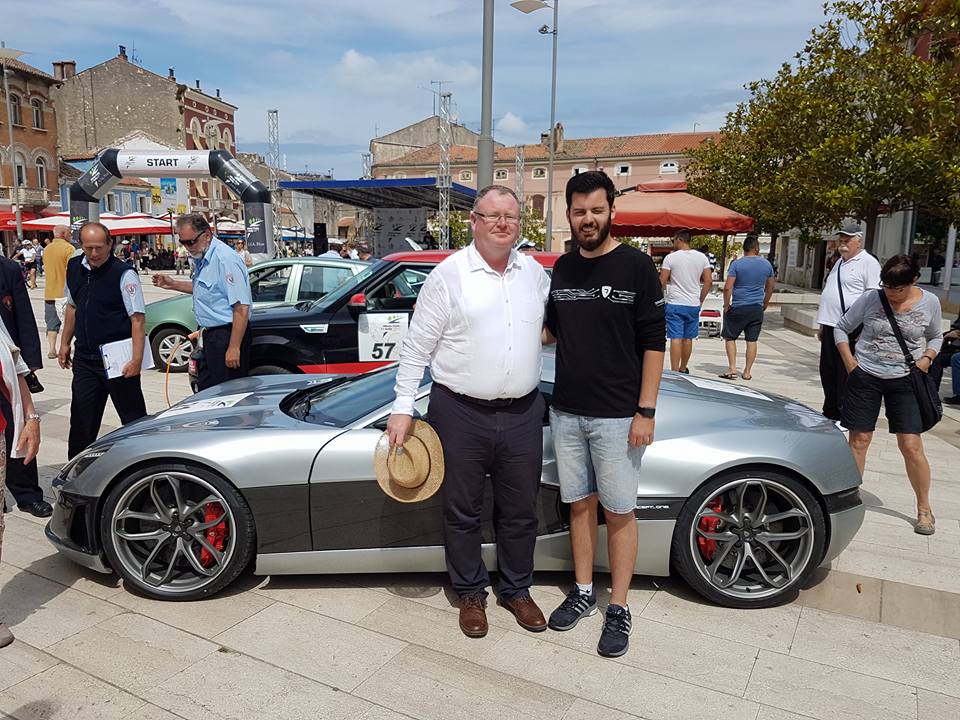
And no, I don't really know him. We have met briefly 3-4 times briefly and always exchanged a laugh. He comments occasionally on my wall (mostly about posts on Del Boy and Rodney, funnily enough), but the more I have followed the Rimac story, the more I appreciate what he does for Brand Croatia, and what an asset he is for the country's tourism.
And I had come to that conclusion even before the release of THAT video about living and working in Croatia.
And it turns out that Rimac Automobili offer their own unique tourism experience to visitors to Croatia, one which makes for an excellent day trip out of Zagreb, to the company's headquarters in Sveta Nedelja, about 25 minutes from Zagreb city centre.
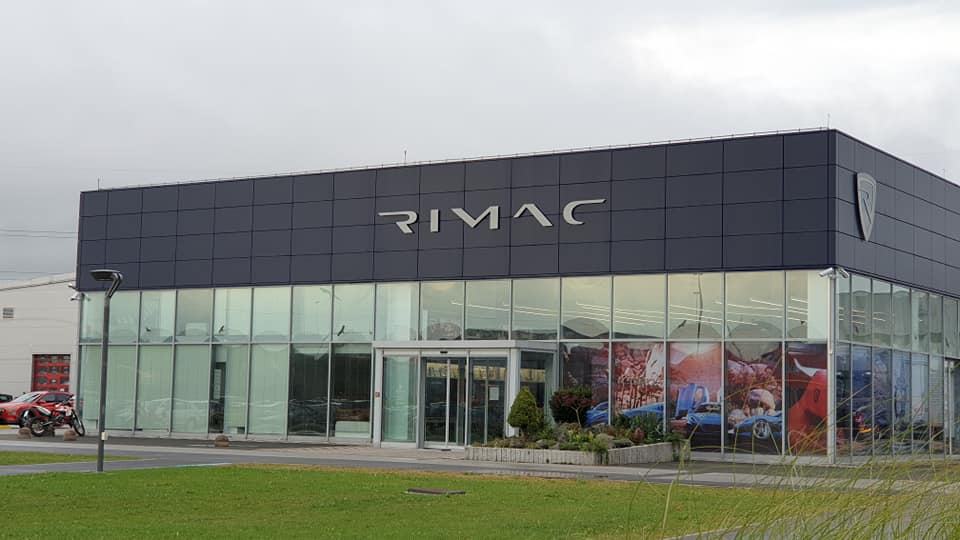
Rimac has kept things very local despite his rapid expansion, and the company is very much at home in the town named the best for the economy for the last three years running.
I had the chance to finally visit the factory where all the magic a few months ago, and I was delighted to learn that there is an officially organised Rimac tour for car enthusiasts.
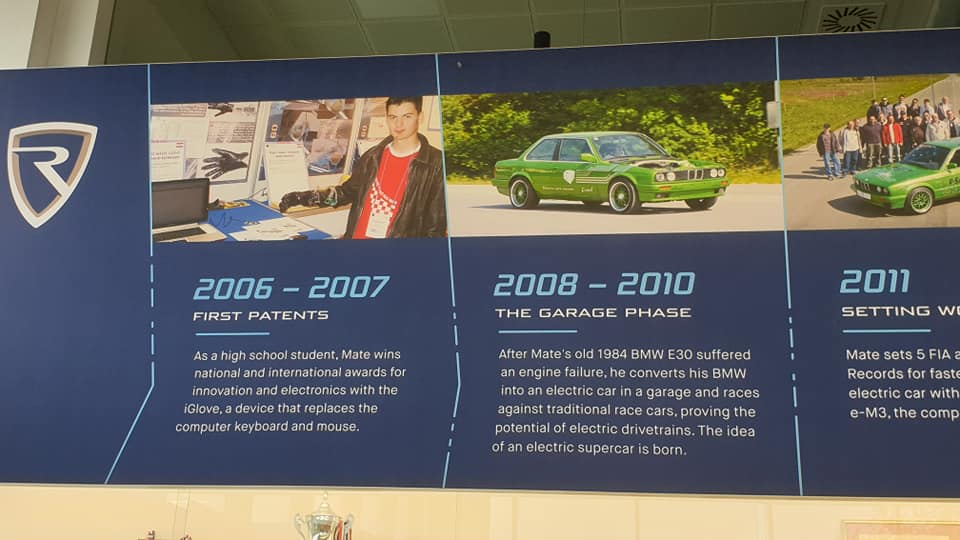
Details of the tour are in detail below, but I really liked the reception area where it all began, including a fascinating timeline of where it all started, and where it is today. young Mate looking more like Del Boy back in 2006 as a high school student winning national and international awards for innovation with the iGlove, before moving on to 'the Garage Phase' with his beat-up 1984 BMW E30.
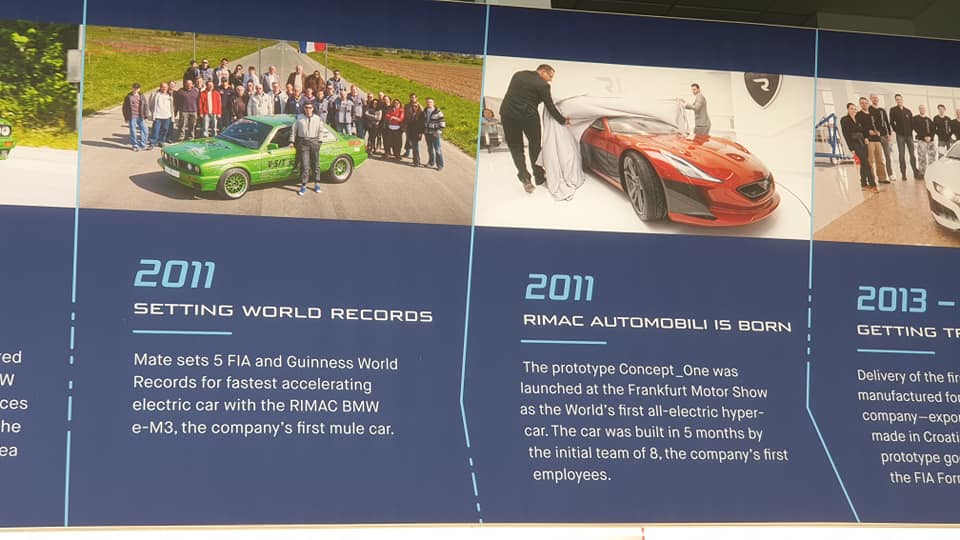
2011 must have been quite a year - from setting world records to the launch of the prototype of Concept_One as the world's first all-electric hypercar at the Frankfurt Motor Show.
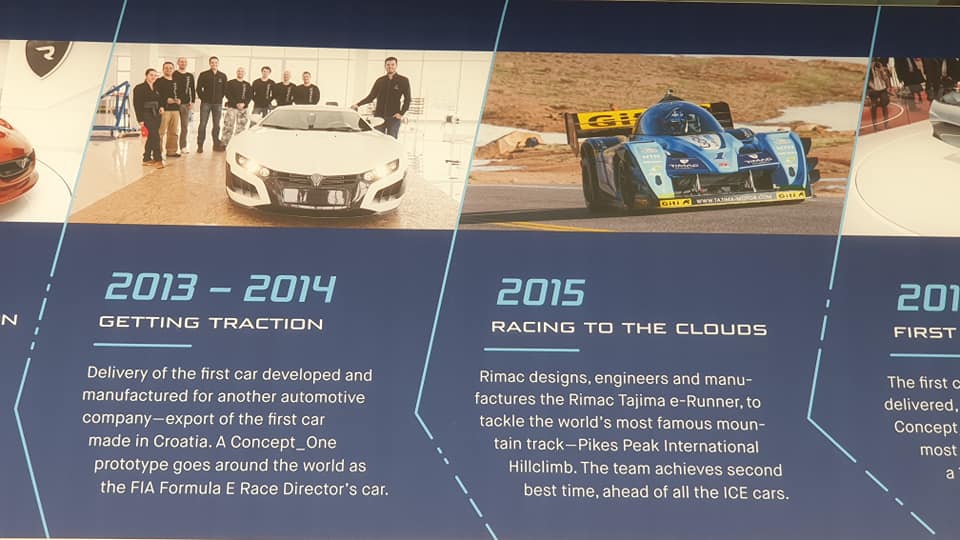
And so the years rolled by, with a growing team and increased success and international recognition.
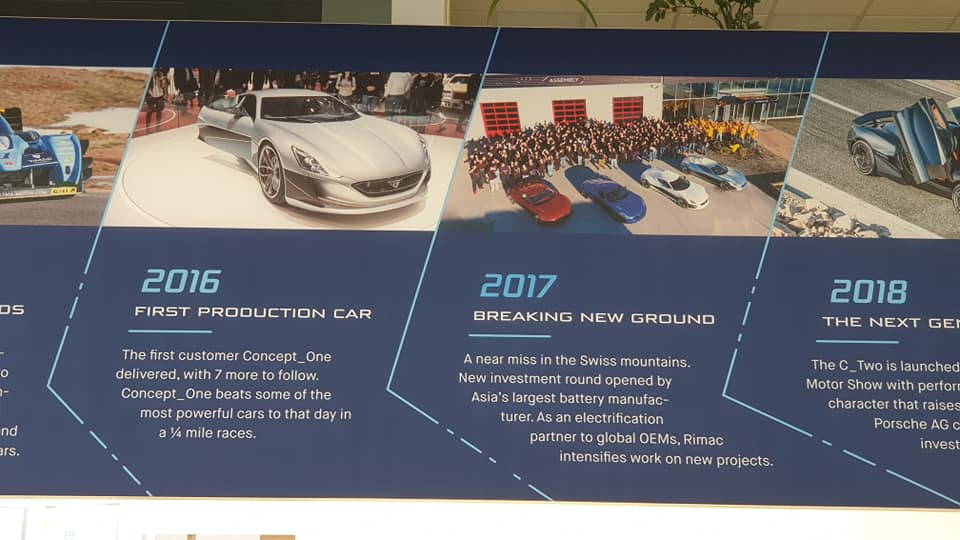
The history of the company is beautifully recorded in this timeline, but that is only part of the fascinating tour, which needs to be booked in advance (and I suspect may not be currently available due to coronavirus restrictions).
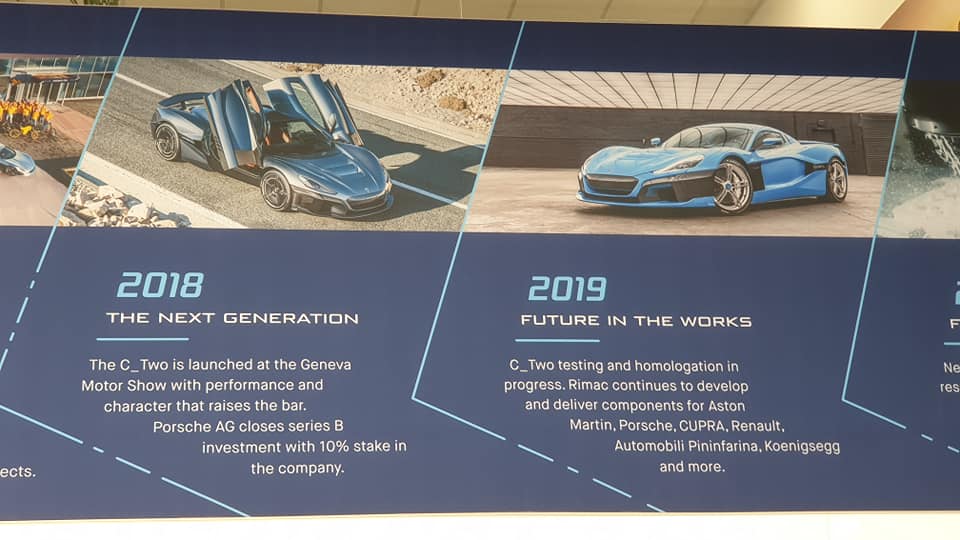
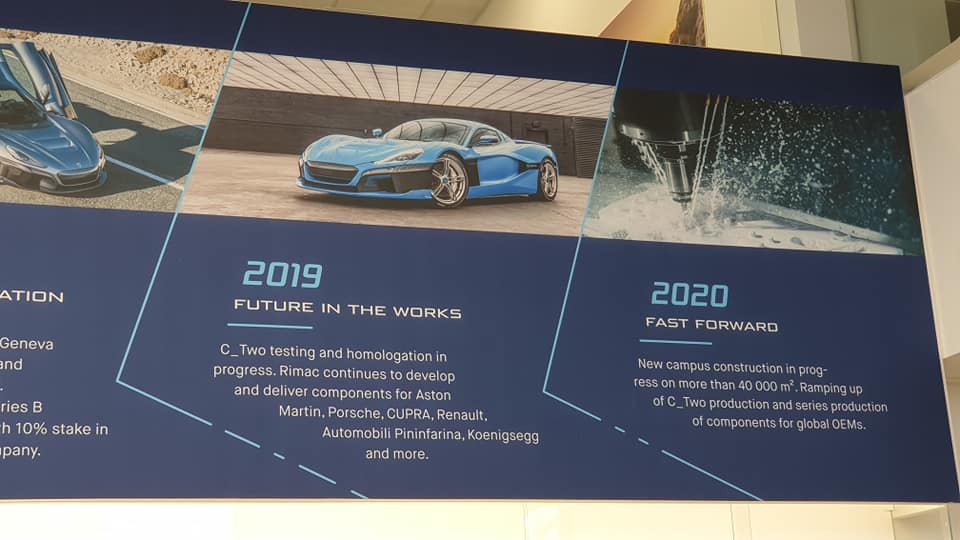
The standard tour costs 225 kuna (30 euro - 10 euro for students), with a 50 euro premium tour including a test ride with the revolutionary Greyp bikes. Sadly, a ride in the Concept_One or C_Two is reserved for customers only.
But here is what the tour includes, with photos from the official Rimac site - photography on the tour itself is restricted.
History
Walk down the history line and meet the iconic Concept_One, our technology in other hypercars and our next generation, the C_Two.

Machining
Explore of the process of various raw materials turning into molds that go further in the process or into finished parts used in the components or vehicle assembly.
Composites
Learn about different composites used in hypercar production as well as the steps taken from mold preparation to a finished part.
Paintshop
Grasp the complexity of our painting process and various methods used to create state-of-the-art hypercars.
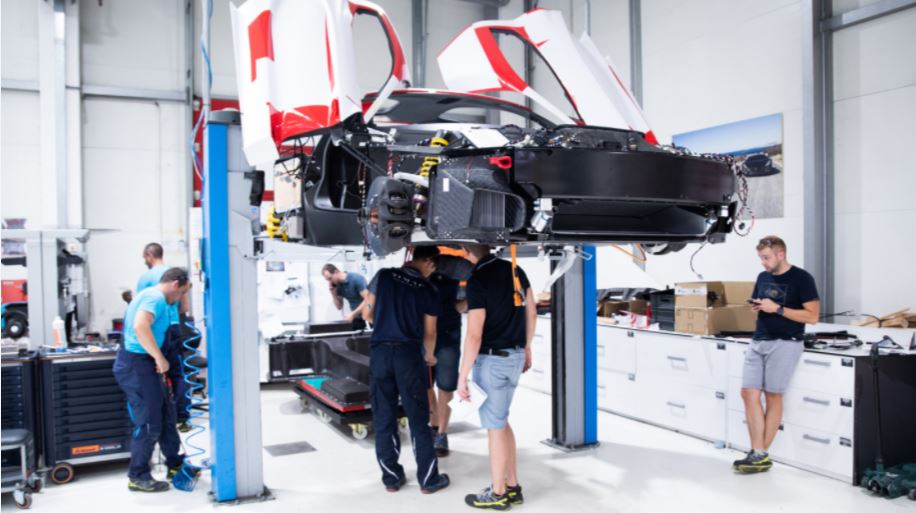
Prototype Assembly
Watch all the parts come together in our prototype assembly area.
Engineering
Meet the team behind the world's most advanced electric hypercars and EV technology, the brain of the operation.
One of my favourite questions in the tour FAQ is:
CAN WE HAVE A CHAT WITH MATE RIMAC?
Due to Mate’s busy schedule we can’t promise you will have a chance to meet him. Maybe, you will have a chance to see him working with some of our engineers or technicians.
Should corona not be an issue, tours are generally available Monday to Friday from 10:00 - 13:00. You are advised to check everything in advance in these uncertain times on the Rimac tour dedicated page.
And while you are there, why not make a day of it in Sveta Nedelja. The nature is beautiful and the lakes are magical. Check out the official promo video from the Sveta Nedelja Tourist Board.
For the latest from Rimac and Sveta Nedelja, follow the TCN Rimac and Sveta Nedelja sections.


